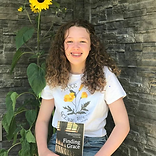
Youth-Led Community Research
Sharing our Community-based findings...
Between November 2019 and February 2020, a handful of digitally savvy youth were trained in how to conduct qualitative and quantitative research, both online and in person.
Below you’ll find just some of the results that justified a new public engagement strategy with digitally driven young people—this time designed to engage the Canadian public in active citizenship through books and the arts in general.

The main focus of my project was how social media affects the connection between Atlantic Canadian youth and our culture. I wanted to know how specific platforms, and the amount of time spent on those platforms, impacted this connection. I was intrigued by the patterns, which suggested that youth using platforms such as Instagram and Snapchat, felt more of a connection than those using Tik Tok or YouTube. I also discovered that the youth that spent longer periods of time on social media, had a better sense of connection to our culture, and had posts relating to Atlantic Canada appearing in their feeds more often.
Click here to view Youth Ambassador Ellie's Community Based Research results.
The question that drove my research was, "What defines Atlantic Canadian identity and how do people relate to it?" I collected data between December 2019 and January 2020 from students at my high school. I found out more about the people who make up my community and learned about their connections to home.
Click here to view Youth Ambassador Katie's Community Based Research results.

I began my research with an interest in how young adults are utilizing online spaces, mainly different social platforms, to either connect with people who have very different spatial identities or with those are share the same spatial identities. I will be using spatial identity to refer to the sense of space, home and identity that we develop as we grow and live in certain regions.
Click here to view Youth Ambassador Lauren's Community Based Research results.

Lauren Stevens
Through my research , I proposed to obtain data that would understand how an educator could engage the youth of Atlantic Canada into the dynamic world of literacy. All of the data was collected by a Google Form. To gather the information I created five questions- three multiple choice and two short response questions. I posted the survey on social media (Twitter and Facebook) and I left it for a week to allow people to complete it. A total of 70 people participated in my survey. Most of the respondents were from Newfoundland but there were a couple of people from other parts of Atlantic Canada. Most of the participants were between the ages of 30-40. This contradicted my original research plan in which I was expecting more people between the ages of 15-30. I noticed that most of the participants were teachers or had a profession in education
Click here to view Youth Ambassador Molly's Community Based Research results.

My goal was to figure out the patterns of those posting online about books and what sparked someone’s desire to share their reading experience, their opinions about these books, and the pictures of their books in an online, social space.
Click here to view Youth Ambassador Jessica's Community Based Research results.

Jessica Parsons
In this research I wanted to focus on the connections one has to their community, and whether engaging with the local arts has an effect on said connections. Along with a general consensus that such an effect is fairly common, the results also show whether or not the respondents actively seek out this experience by purposefully looking to local literature.
Click here to view Youth Ambassador Oliver's Community Based Research results.






